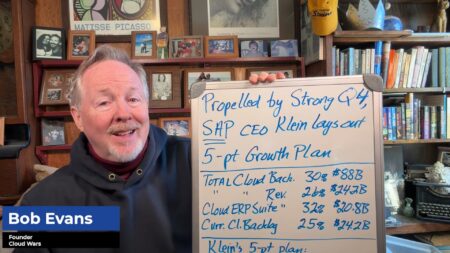
The CFO’s role is transforming: becoming multi-faceted and requiring executives to adopt a more proactive approach to the business. Instead of focusing largely on oversight and governance, the role now also requires a sharp focus on value creation.
Yet, to harness these skills and drive real value, CFOs must have a keen understanding of the technologies and tools available to manage the financial state of the organizations they lead and simultaneously create value.
At the recent Workday Rising conference in San Francisco, Cloud Wars founder and Acceleration Economy co-founder Bob Evans caught up with Ash Noah, vice president and managing director of management accounting and environmental, social, and governance (ESG) at AICPA and author of the whitepaper, From Scorekeeper to Futurist: the Journey to Finance 5.0, to take a deep dive into this topic.
Become a Value-Driven CFO
To kickstart the discussion, Bob references a passage from the recent AICPA-CIMA whitepaper about the need for CFOs to enable finance teams to leverage artificial intelligence (AI), machine learning (ML), and related technologies to automate mundane tasks and augment value creation. Ash explains that while this is an aggressive agenda, it also provides an unprecedented opportunity for finance to embrace technology.
“You don’t want to be just counting the score. You want to be in the game,” he says. “And technology and automation are enabling that.”
So, where should a CFO focus in this climate of value creation? Bob identifies four areas mentioned in the paper that a CFO needs to deliver on: customer experience, data access, predictive insights, and risk management. Until now, customer experience isn’t usually a business objective that falls under the CFO’s purview. What’s changed to make it a top priority?
“The fundamental reason a CFO and a finance function exists is to create value and to preserve value,” says Ash. “Finance has been really good at preserving value, but to shift to value creation, one needs to start engaging in the business model.
“The top dimension of value creation in the business model is the customer value proposition.”
Ash explains how finance has always been focused on costs and revenue. The challenge for finance teams and their leaders is getting involved with the different dimensions that lead to costs and revenue.
A Framework for the Modern CFO
In his research, Ash and his team, alongside FORTUNE 500 and Global 1000 companies, developed the Accounting and Finance Assessment Model for Effectiveness (FAME), a framework to help CFOs and finance teams transition into the role of value creators.
“In our research, we have identified five key dimensions that enable a CFO to move towards value creation,” says Ash. These include:
- Technical skills: covering finance and accounting
- Business skills: the closer a CFO is to the business, the more they can participate in value creation
- People skills: value creation requires collaboration
- Leadership skills: ensure CFOs shouldn’t just be managing but also getting involved with technical strategy
- Digital skills: sit at the model’s center because they are applicable to all the others
Ash explains that these digital skills require CFOs to ask questions like: How can technology transform your business model? How can you serve customers in new ways and meet their expectations? And how can you introduce new, transformative products? However, AI, ML, and automation technologies aren’t limited to value-creation activities. For a CFO, these technologies can significantly impact the risk management area, too.
“Ninety percent of enterprise value is sitting in intangible assets, so a major shift is required,” continues Ash. “We in finance are very good at managing the financial capital of a company, the manufacturing capital, but to be in the value creation zone, we need to start shifting to the intangibles.
“These are not the tangible assets. These are intangible assets that are outside of the balance sheet, but they are valued by the marketplace.”
Take customer relationships. They have an intangible value that turns into tangible revenue every year, and it’s areas like this where CFO engagement is required. This is when you need to estimate a range of values or even proxy values, a significant step away from the black-and-white operations that financial professionals are used to. The aim is to progress from scorekeeper to advisor to partner and, finally, to excel in value creation as a futurist.
Wrap-Up
The time has come for CFOs to adopt and evangelize the technologies that will bring value to their organization. Yet, finance executives can’t let go of the fundamentals of risk management. Finance operations must be anchored in them. However, to create value, you need to make the leap into other areas.
As Ash puts it, “In order to transform, there are two other t’s that are essential, and that’s talent and technology. Talent plus technology will enable transformation.”
The insights presented in From Scorekeeper to Futurist: the Journey to Finance 5.0 follow the trajectory of Industry 5.0, where human beings and intelligent machines work cohesively to leverage the most transformative technologies. Workday embodies this vision with AI at its core, enabling users to adapt and thrive in a more connected, technology-centric world.
Discover how AI has created a new ecosystem of partnerships with a fresh spirit of customer-centric cocreation and a renewed focus on reimagining what is possible. The Acceleration Economy AI Ecosystem Course is available on demand.









